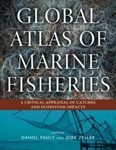"This short, very sharp book demonstrates how 'normal' science need not be very normal at all, nor necessarily overly scientific, to come out on top. It is the product of meticulous research and is written with rare skill and verve [...] An instant classic."
– Isis
"Finley correctly observes that once fishing power sufficient to catch the maximum sustainable yield has been built, it generates pervasive political pressures that make dialing it back nearly impossible."
– Carl Safina, Science
"This smart little book has all the trappings of a historical account, with endnotes, an extensive bibliography, and a comprehensive index, but it can also be read as a whodunit. The crime scene is the Pacific Ocean, and the motive was access to the fish resources that both Japan and the US were exploiting and/or eyeing, especially salmon in Alaska and tuna in the Pacific, the latter also requiring small bait fishes from coastal waters in Central America. The victim was good faith – the use of argument based on scientific evidence to articulate legitimate positions. The villain is US foreign policy, specifically its fisheries branch [...] [and] the weapon used for the deed, and the main theme of this book, was the concept of 'maximum sustainable yield' (MSY), used by Latin American politicians who objected to the expansion of US tuna fisheries into what later became their exclusive economic zones (EEZs), long before MSY became quantifiable."
– Quarterly Review of Biology
"A powerful book, with implications aplenty reaching far beyond the realm of fisheries management."
– H-Environment
"This comprehensively referenced and highly readable precautionary tale should be read by everyone engaged in any aspect of fishery management – especially those who espouse the cause of MSY without question."
– Journal of Fish Biology
"This little book, if read by key decision makers, should help to galvanize a reaction against the continuation of the fishery policy currently followed by most seafaring nations [...] [Finley's] account of an important topic will be of value to students as well as professional biologists, politicians, and economists."
– J. C. Briggs, Choice
"Finley's monograph is a brilliant exploration of Cold War international politics and scientific intrigue."
– Rodolfo John Alaniz, University of California, San Diego, Journal of the History of Biology
"While its title sounds harmless enough, this book explodes the myths surrounding MSY, which we learn began its career supporting the commercial interests of the US tuna and salmon fisheries against their competitors – long before scientists anywhere knew how to calculate anything resembling maximum sustainable yield. It is fascinating, although it does demonstrate how ignorant we are of the strange origins of what is still a controversial concept. There is a stark lesson to be learned in an era in which a similar new term, 'ecosystem-based fisheries management,' is bandied about as if people know what it is."
– Daniel Pauly, University of British Columbia
"Fisheries science and management are ripe for study by professional historians skilled in archival research and analysis. Here Carmel Finley applies both of these skills in abundance, focusing them on the great salmon and tuna fisheries of the North Pacific, and particularly the events surrounding the negotiations of the post–World War II peace treaty between Japan and the United States and the trilateral International Convention for the North Pacific Fisheries. She demonstrates how the ideas of the time percolated the 1958 conference on the Law of the Sea and, eventually, came to reside in the 1982 UN Convention on the Law of the Sea. As a true historian, Finley also reaches back to the origins of the concepts of fisheries science in the research and politics of the 1930s in Europe and North America, and relates the personalities of the major players with the institutional and political framework within which they were operating. A tour de force indeed."
– Sidney J. Holt, coauthor of On the Dynamics of Exploited Fish Populations
"The decline and collapse of world fisheries is repeatedly cited as exemplary of the 'tragedy of the commons' – the dilemma whereby individuals, acting in their own rational, individual self-interest, destroy a common good. Using extensive primary sources, Carmel Finley shows that this view is incorrect, and that the decline of fisheries had little to do with the inadvertent adverse impacts of individual action, and everything to do with deliberate governmental and international policy. Since the end of World War II, the United States has consciously pursued a policy of encouraging more and more and more fishing, a policy that had little to do with the needs or interests of fishermen (much less fish) and everything to do with U.S. strategic and economic interests. Not surprisingly, fishermen and fish suffered the consequences. It was a tragedy, but not of the commons. It was a tragedy of attempted enclosure. This is a very important book, one that no environmentalist can afford to ignore."
– Naomi Oreskes, University of California, San Diego























![Les îles Saint-Paul et Amsterdam (Océan Indien Sud): Environnement Marin et Pêcheries [Saint-Paul and Amsterdam Islands (South Indian Ocean): Marine Environment and Fisheries]](http://mediacdn.nhbs.com/jackets/jackets_resizer_medium/26/260268.jpg?height=150&width=107)












